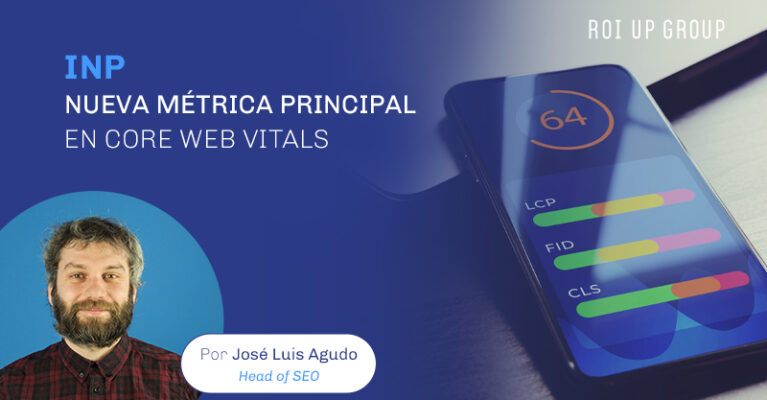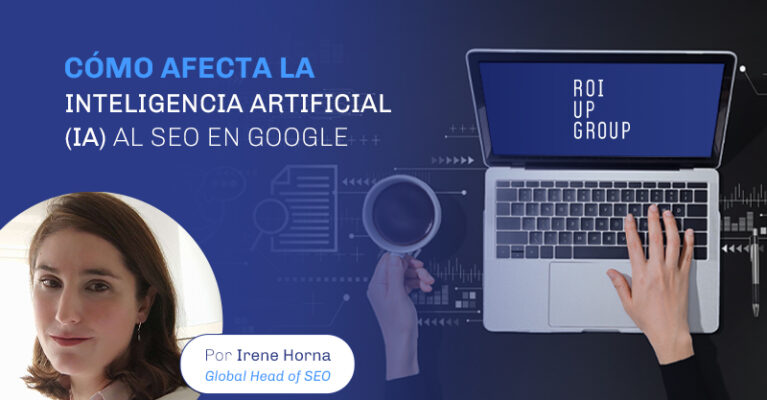
Is your website ready to be GEO Friendly? This is how we have done it at ROI UP Group
By Diego Jiménez, CEO of ROI UP Group
2024 has been a key year in the evolution of the digital ecosystem, and everything points to 2025 continuing in the same vein. The irruption of generative artificial intelligence in Google’s search results, with its new functionality Google AI Overviews has marked a turning point in the way people search and, consequently, appear on Google. Since May 2024, Google started to implement this new search experience in the US and LATAM, in 2025 it has already started its global rollout. We have been working on LATAM and U.S. projects since then, and we announced weeks before its arrival in Europe the impact it would have. the impact it would have.
As announced during the Google I/O 2024 event and on the company’s official company’s official blogThe goal is to offer more complete, natural and useful answers to users, prioritizing quality, search intent and context.
These changes completely change the user experience and force brands and agencies to review their digital strategies. Where it used to be a major factor to appear in the top positions, now it is also about appearing in the answers generated by LLMs and in Google AI Overviews.The ones that users will see before they even click on them. And to achieve this, you have to work with a vision of the future, adjusted to the new rules of the environment.


In ROI UP Group we have taken on this challenge as an opportunity. We want to position ourselves as the leading leading agency in brand positioning in Spanish, Portuguese and English within AI tools.
Adapting is not an option: it is the only valid strategy in an environment where evolution is constant. And to adapt, you need to understand the new framework, learn to move within it… and build from there.
From SEO to GEO: the natural evolution of digital optimization
As we have seen over the years, the digital ecosystem is evolving and in recent months by leaps and bounds. We are gradually entering a new reality where GEO (Generative Experience Optimization) has become the main actor. Web optimization should no longer be focused on the dynamics of traditional search engines, now our strategies must take into account the way in which artificial intelligences interpret and return information in response to user queries. In this context, SEO becomes an essential foundation on which to build an effective GEO strategy. If you don’t work on your content, if you don’t structure your website correctly, if you don’t provide real value in a hyper-informative context… you won’t appear. Neither in the rankings, nor in the generative responses.
This is where a key concept comes into play for us at ROI UP Group: the Generative Digital Footprint. That is, the set of information, data, content and perceptions that a brand leaves in the digital environment, and that now generative tools such as ChatGPT, Gemini or Perplexity use as a basis for providing answers. It is not enough to position well in traditional search engines, now you also have to make sure that what is said about you on external platforms, social networks or specialized media is aligned with your narrative and your value proposition.
At ROI UP Group we have been working precisely on reinforcing that footprint, making sure that everything we publish meets EEAT standards: Experience, Expertise, Authoritativeness and Trustworthiness.. Experience, knowledge, authority and trust. This is the filter by which Google – and its AI – measures quality.
One domain, one global identity
One of our most important strategic steps has been to unify our digital presence under a single global domain: roiupgroup.com. This decision stems from in response to the evolution of Google’s search experience, where a more integrated and global view is now prioritized. The expansion of answers offered by AI-based search engines, encompassing more than 100 countries with millions of monthly users has changed the view of “geolocation”.
This implies that the responses generated are based on a holistic view of a brand’s digital presence, no longer differentiating where the user is searching from. It is therefore important to consolidate all our information. under a single global domain. With this step, we not only improve visibility, but also reinforce our Generative Digital Footprint and ensure that the information returned through user queries is consistent and aligned with our brand identity, personality and values.
Big brands are already doing it: they are creating unified digital ecosystems that allow them to have greater control, better positioning and more visibility. And in an environment where search engines are increasingly focused on entities and relationships between concepts, having a cohesive digital identity is not just an advantage… It’s a necessity..
Contents with greater extension, evergreen and multiformat
Another of the pillars on which we have worked intensively has been the content of our website. In the past, it was already important to publish extensive and well-elaborated articles. Today, it is essential. Why? Because AI mainly processes text. And the more complete, clearer, deeper and more up-to-date it is, the more likely it is to be used in the answers generated.
We are committed to what we call evergreen content, one that does not expire, that responds to recurring user queries and that continues to be useful over time. If it used to be a common practice in the media, it is now also common in corporate environments. At ROI UP, we apply this logic to our service pages, blog articles and specialized guides, our focus lies in creating content that clearly responds to real doubts, with a logical structure, accessible language and a clear informative intention.
Our entire content strategy is driven by the GEO (Generative Experience Optimization) approach. GEO (Generative Experience Optimization) approach.This means thinking of each piece of content not only as a response to the traditional search engine, but also as a piece that can be picked up by an AI tool as part of its response construction. This is an essential part of our Generative Digital Footprint strategy: it’s not just about positioning, but actively influencing how you are talked about in generative environments.
It is not about writing for the sake of writing and filling your website with extensive content or “talking for the sake of talking”, but about generating information that adds value and is useful for the user and understandable for the AI. And if we can also integrate it in different formats (video, infographics, audio, text), so much the better. Multiformatting not only enriches the user experience, but also makes it easier for the content to be useful in more search contexts.
Learning from users: search patterns applied to our website
One of the great benefits of working closely with data is that you can observe patterns. In our case, we have analyzed the paths and search behaviors of our own users and customers to detect what type of information they seek, how they formulate it, from what devices, at what times and with what intention. The following have been identifiedFor example, an increase in more complex and specific queries, especially among younger users, who are looking for precise and personalized answers in fewer steps. We have also seen increased use of mobile devices and visual formats, such as searches that combine text and image.
This information has allowed us to optimize the structure of our website, anticipate common doubts, improve accessibility to our key content and adapt our messages to real searches. In short, to create a website that is not only visible in search engines, but also useful for those who reach it. Y, and to provide consistent signals that feed our Generative Fingerprinting.
The voice of your community as a strategic assetUGC
In this new ecosystem of search and response generation through AI, it is no longer only relevant what you publish, but also what others say about us. Review platforms, forums, profiles on Google Business or opinion sites are mainly fed by UGC (User Generated Content), i.e. user-generated content: from reviews and ratings to photos, comments or spontaneous videos. This type of content has become a key source for AI tools, which interpret it as a sign of trust and authority.
When a user searches for information about a company, search engines do not limit themselves to displaying the corporate website. They integrate evaluations, ratings, opinions… and that conditions the degree of trust you transmit. Positive evaluations generate a cognitive bias in users, known as the halo effect, which reinforces the general perception of quality, even in aspects that are not directly evaluated. According to The Decision Lab, this bias can cause a single positive feature, such as good customer service or an enthusiastic review, to influence how we perceive other attributes of the product or service, such as its reliability or perceived value.
That’s why, at ROI UP Group, we actively encourage recommendations from our customers and employees.. Because we know that this external layer of credibility is essential to feed the search engines… and to build a strong brand at all levels. And, above all, because it’s part of a strong Generative Digital Footprint, where every voice counts in shaping the overall perception we convey to the new AI-enabled searchers.
Adapting is positioning
In a scenario in which algorithms change, artificial intelligence evolves and users demand more and more, having a GEO Friendly website is not an option, it is the new standard.
At ROI UP Group we are clear, adapting is not synonymous with improvising, but preparing. That is why we have redesigned our digital presence from the ground up: global domain, quality content, Generative Digital Footprintapplied search patterns, and active digital reputation. To position ourselves as the leading agency in brand positioning in Spanish, Portuguese and English within AI tools.
And this is just the beginning. Because in an environment that changes every month, the only way to stay relevant is to constantly evolve. It’s not a matter of fads, it’s a matter of strategy.
List of SEO publications
- How Google will change in the near future
- Is your website ready to be GEO Friendly? This is how we have done it at ROI UP Group
- User behavior on Google in the Pharmaceutical Sector
- The importance of the ALT attribute
- Voice searches and how to adapt your SEO to them
- Keyword tracking: what is it and how is it done?
- How AI affects SEO strategies
- How Artificial Intelligence (AI) affects Google SEO
- Artificial intelligence (AI) and SEO: everything you need to know
- How to optimize your Google My Business profile




